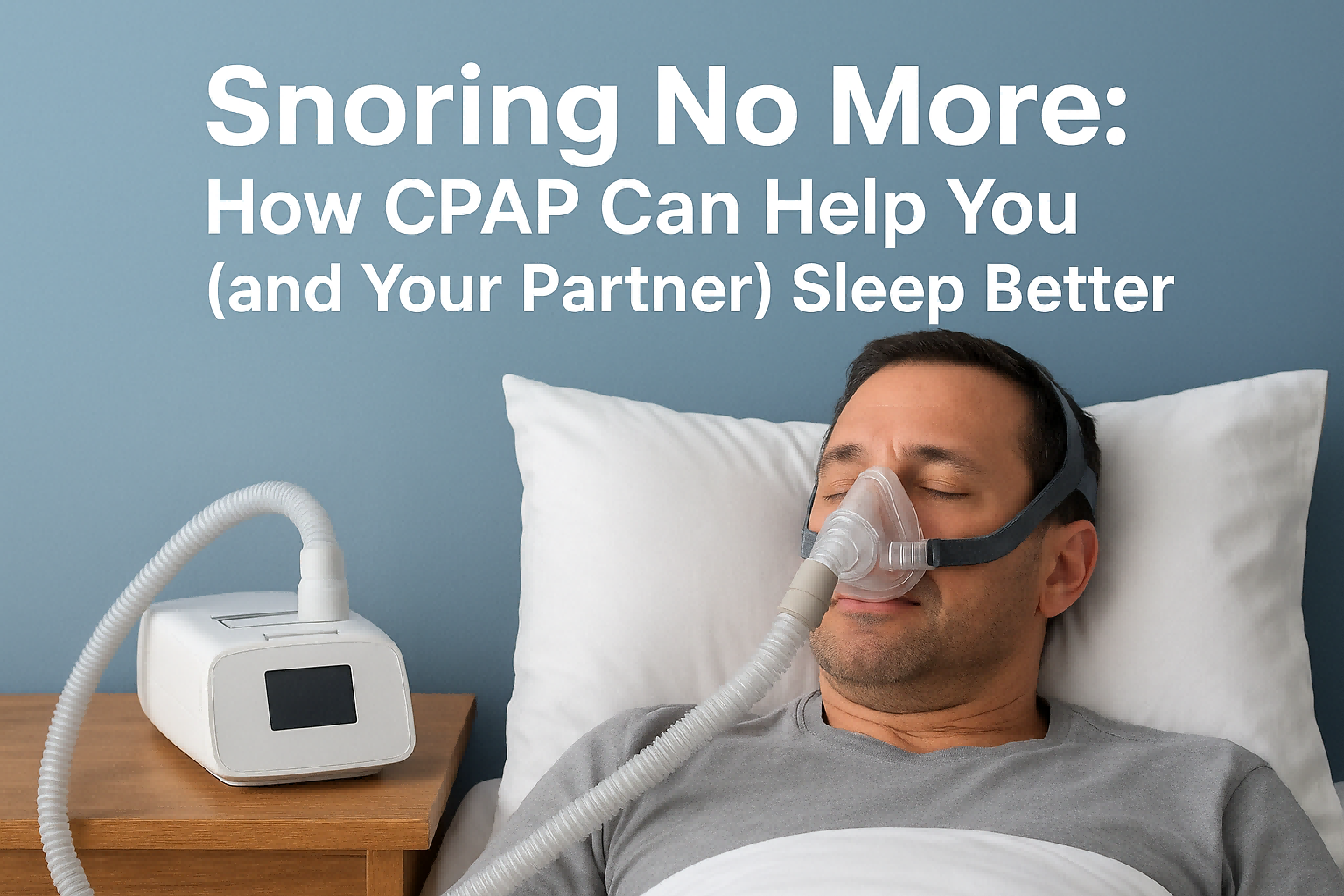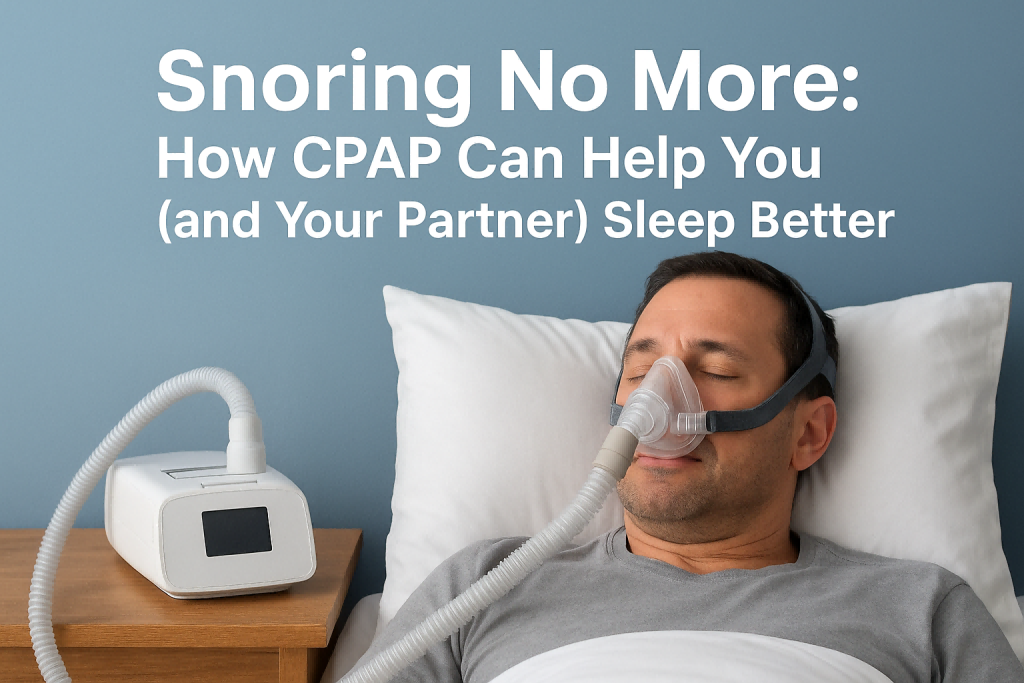Snoring No More: How CPAP Can Help You (and Your Partner) Sleep Better


Understanding Snoring and Its Impact on Sleep
Snoring is often dismissed as a harmless nighttime annoyance, but in reality, it can have significant consequences for both the snorer and their partner. For many couples, the nightly rumble of snoring leads to frustration, interrupted rest, and even sleeping in separate rooms. While occasional snoring may be normal, persistent and loud snoring often points to an underlying sleep disorder, such as obstructive sleep apnea (OSA).
What Causes Snoring?
Snoring happens when airflow through the nose and throat is partially blocked. As air struggles to pass through narrowed airways, the surrounding tissues vibrate, creating the familiar snoring sound. Several factors can contribute to snoring, including:
- Relaxed throat muscles during sleep
- Excess weight leading to airway narrowing
- Nasal congestion or sinus issues
- Alcohol or sedative use before bedtime
- Sleep position, particularly lying on the back
Why Snoring Affects Both You and Your Partner
Snoring doesn’t just disturb the person who snores—it disrupts the partner’s sleep as well. Studies show that partners of habitual snorers can lose more than an hour of rest each night, which contributes to irritability, poor concentration, and even relationship strain. Over time, the cumulative effects of snoring can impact health, intimacy, and overall quality of life for both individuals.
Sleep Apnea and Snoring: The Hidden Connection
Snoring is often more than a noisy habit—it may be a symptom of a more serious sleep disorder.
What Is Obstructive Sleep Apnea (OSA)?
OSA occurs when the airway repeatedly collapses or becomes blocked during sleep, causing pauses in breathing that can last for seconds or even minutes. Each episode reduces oxygen levels, forcing the brain to wake the sleeper briefly to restore breathing.
Signs You Might Have Sleep Apnea
If you or your partner snore loudly and experience any of the following, sleep apnea may be the culprit:
- Gasping or choking during sleep
- Excessive daytime fatigue
- Morning headaches
- Difficulty concentrating
- Mood swings or irritability
The Risks of Untreated Sleep Apnea
Leaving sleep apnea untreated carries serious health risks, including:
- High blood pressure
- Heart disease and stroke
- Type 2 diabetes
- Memory problems and cognitive decline
That’s where CPAP therapy steps in as a proven solution.
Introduction to CPAP Therapy
CPAP, or Continuous Positive Airway Pressure, is the gold standard treatment for sleep apnea and chronic snoring.
What Does CPAP Stand For?
CPAP stands for Continuous Positive Airway Pressure. It works by delivering a steady stream of air through a mask, keeping the airway open during sleep.
How CPAP Machines Work
A CPAP machine consists of three main parts:
- The machine itself, which generates pressurized air
- Tubing, which delivers the airflow
- A mask, worn over the nose or mouth, that directs the air into the airway
By preventing airway collapse, CPAP stops the vibrations that cause snoring and ensures uninterrupted breathing.
Types of CPAP Devices Available
- Standard CPAP: Delivers a constant pressure throughout the night
- BiPAP (Bilevel Positive Airway Pressure): Provides two pressure levels—one for inhalation and one for exhalation
- APAP (Auto-Adjusting Positive Airway Pressure): Adjusts airflow based on breathing patterns
Benefits of CPAP for Snoring and Sleep Apnea
The benefits of CPAP therapy go far beyond eliminating snoring.
Reducing or Eliminating Snoring
For most users, snoring stops almost immediately once CPAP therapy begins. By keeping the airway open, CPAP eliminates the source of vibration.
Improving Sleep Quality for Both Partners
With CPAP, not only does the user breathe more easily, but their partner finally gets a quiet, restful night. Couples often report stronger relationships and improved intimacy once snoring no longer dominates the bedroom.
Long-Term Health Benefits
Regular CPAP use reduces risks of:
- Heart disease
- Stroke
- Daytime fatigue and accidents
- Memory and cognitive issues
How CPAP Helps Your Partner Sleep Better Too
One of the most overlooked benefits of CPAP therapy is the positive effect it has on the bed partner. While the machine is designed to treat the individual with sleep apnea, its impact extends far beyond.
Restoring Quiet Nights
Before CPAP therapy, many partners endure the nightly soundtrack of snoring, choking, and restless tossing. Once CPAP is introduced, the steady hum of the machine replaces disruptive sounds. This consistent background noise is often far less disturbing than unpredictable snores, allowing partners to fall asleep faster and stay asleep longer.
Reducing Relationship Stress from Snoring
Chronic snoring can cause couples to sleep in separate rooms or argue about bedtime habits. By addressing the root cause, CPAP therapy helps restore peace and intimacy in relationships. Couples often report improved emotional connection, better moods, and even increased energy for daytime activities once restful sleep is restored.
Getting Started with CPAP Therapy
Starting CPAP treatment may seem daunting at first, but understanding the process makes it much smoother.
The Role of a Sleep Study
Before CPAP can be prescribed, most patients undergo a sleep study (polysomnography). This test measures breathing patterns, oxygen levels, and sleep stages to confirm the presence and severity of sleep apnea.
Choosing the Right CPAP Machine and Mask
No two sleepers are alike, which is why customization is key. Options include:
- Nasal masks – lightweight and ideal for nose breathers
- Full-face masks – suitable for mouth breathers or those with nasal congestion
- Nasal pillow masks – minimal design, great for side sleepers
Selecting the right device and mask ensures comfort and better compliance.
Tips for Adjusting to CPAP Use
- Start by wearing the mask for short periods while awake
- Use the machine during naps to get used to the sensation
- Practice good mask hygiene by cleaning it daily
- Work with your provider to fine-tune pressure settings
Patience and consistency are key—most users adapt fully within a few weeks.
Common Challenges with CPAP and How to Overcome Them
Like any medical device, CPAP can present some hurdles, but most are easily managed.
Mask Discomfort
Poorly fitting masks may cause skin irritation or leaks. Adjusting straps, switching to a different mask style, or using mask liners can make a world of difference.
Dry Mouth or Nasal Congestion
Some users experience dryness due to airflow. Modern CPAP machines often include built-in humidifiers that add moisture, preventing irritation. Saline sprays can also help keep nasal passages comfortable.
Travel and Lifestyle Considerations
Many people worry about traveling with CPAP, but modern machines are compact and portable. There are travel-sized CPAPs designed specifically for frequent flyers, and most airlines allow them as carry-on medical devices without extra fees.
Alternatives and Complements to CPAP Therapy
While CPAP remains the most effective treatment for moderate to severe sleep apnea, some patients explore other options.
Lifestyle Changes That Help Reduce Snoring
- Losing excess weight
- Avoiding alcohol and sedatives before bedtime
- Sleeping on your side instead of your back
- Practicing good sleep hygiene
Oral Appliances and Surgical Options
- Mandibular advancement devices (MADs): Custom-fitted dental appliances that reposition the jaw to keep the airway open
- Surgery: In severe cases, procedures may remove excess tissue or realign the airway
These approaches can complement CPAP or serve as alternatives for those unable to tolerate the machine.
Expert Advice: When to See a Sleep Specialist
If snoring is loud, persistent, or accompanied by daytime fatigue, it’s time to seek professional help. A sleep specialist can evaluate symptoms, recommend a sleep study, and prescribe the most effective treatment plan—often beginning with CPAP therapy.
Frequently Asked Questions (FAQs)
Can CPAP completely stop snoring?
Yes, for most people. CPAP prevents airway collapse, eliminating the vibrations that cause snoring. However, in rare cases, mild snoring may persist.
How long does it take to see results from CPAP?
Many users notice improvement after the first night, while others may take a few weeks to fully adjust.
Is CPAP therapy safe for long-term use?
Absolutely. CPAP has been used safely for decades and is considered the gold standard treatment for sleep apnea.
What if my partner still snores while using CPAP?
Sometimes mask leaks or incorrect pressure settings cause residual snoring. Adjusting the fit or consulting a provider usually resolves the issue.
Can I travel with a CPAP machine easily?
Yes. Most CPAPs are lightweight, portable, and approved for air travel. Many come with travel cases and battery packs.
Is CPAP covered by insurance?
In many cases, yes. Most insurance providers cover CPAP therapy if it is prescribed following a documented diagnosis of sleep apnea.
Conclusion: Sleep Soundly, Live Better
Snoring may seem like just a nuisance, but it can signal a deeper issue like sleep apnea. Fortunately, CPAP therapy offers a safe, effective, and life-changing solution—not only for the person snoring but also for their partner. From eliminating disruptive noise to restoring restful nights and improving long-term health, CPAP truly transforms lives.
If snoring has been disrupting your sleep or straining your relationship, it’s time to consider CPAP therapy. With the right equipment, support, and commitment, you and your partner can finally enjoy the peaceful sleep you deserve.
















